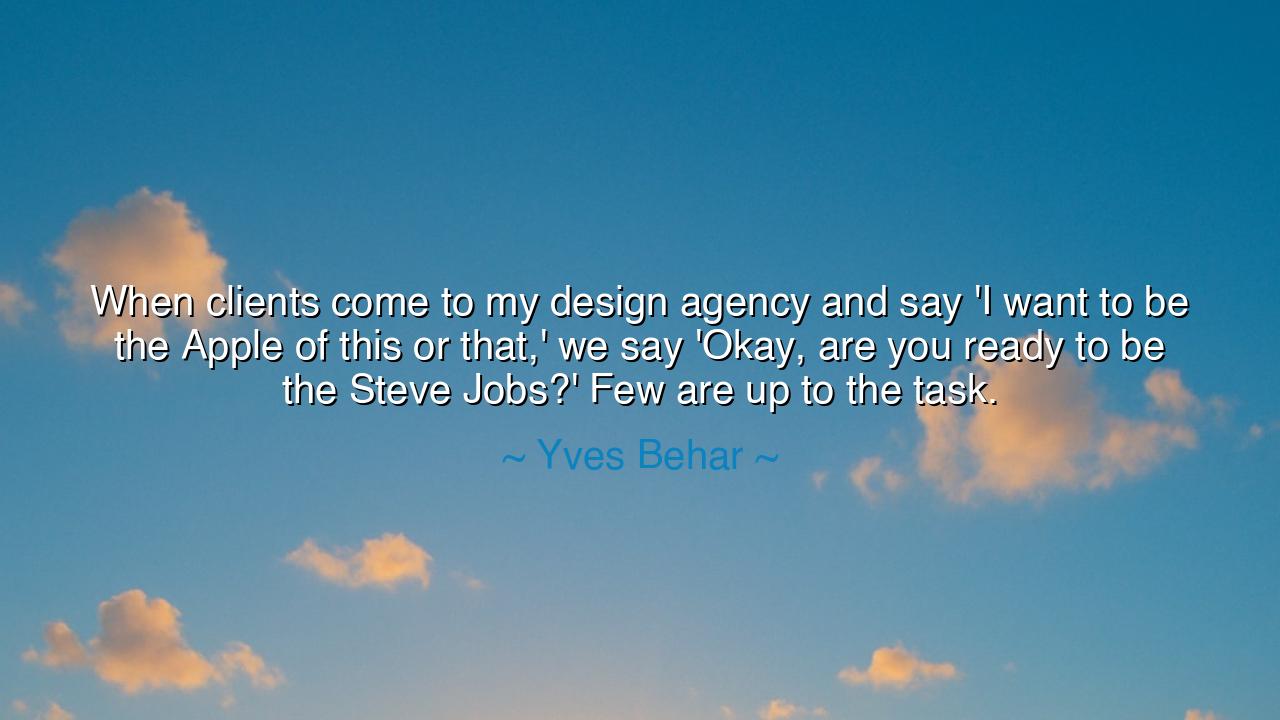
When clients come to my design agency and say 'I want to be the
When clients come to my design agency and say 'I want to be the Apple of this or that,' we say 'Okay, are you ready to be the Steve Jobs?' Few are up to the task.






Yves Béhar, in his wisdom, once said: “When clients come to my design agency and say ‘I want to be the Apple of this or that,’ we say ‘Okay, are you ready to be the Steve Jobs?’ Few are up to the task.” These words, though simple in form, bear the weight of truth that pierces through the illusions of ambition. They reveal the eternal chasm between desire and discipline, between dream and devotion. For every soul that wishes to ascend to greatness must first endure the trials of transformation. To wish to be like Apple, to be revered, admired, and unforgettable, is easy; but to live as Steve Jobs, to suffer, to demand perfection, to sacrifice comfort for vision — that is a road few have the courage to tread.
The origin of this thought lies not merely in the world of design, but in the eternal law of creation. In every craft, every art, every field where men seek to build what lasts beyond themselves, there stands a truth as old as time: greatness demands a price. Yves Béhar, a master of modern design, understood that behind every icon — every product that moves the soul — there is a founder’s fire, a relentless will that refuses compromise. Jobs was not loved for his ease, nor for his politeness, but for his unwavering pursuit of beauty and function, his refusal to settle for “good enough.” Thus, when others wish to “be like Apple,” Béhar reminds them that they must first bear the burden of being like Jobs — visionary, demanding, and unyielding.
Look, then, to the story of Leonardo da Vinci, the ancient master of invention and form. He painted with divine grace, yet behind his masterpieces lay endless years of study, of sketches torn and repainted, of dreams that consumed his nights. Many admired his genius, but few would endure his restlessness, his devotion to detail, his torment over imperfection. The world saw the smile of Mona Lisa; Leonardo saw the battle between light and eternity. And so it is with the creators of our age — the Apples, the Teslas, the Disneys. Each was born not of luck, but of a leader willing to demand more of himself and others than comfort would allow.
The words of Béhar echo as a warning to all who dream of easy greatness. The client who wishes to “be the Apple” sees the glory but not the sacrifice. He covets the crown but fears the weight of it. For to be Steve Jobs is to live with dissatisfaction, to walk forever toward a horizon that recedes with every step. It is to look upon your own work and say, “It is not yet beautiful enough.” And how many today can bear that kind of hunger? How many will destroy the first draft, the tenth draft, the hundredth — until the world itself bends to their vision?
Yet, Béhar’s quote is not a condemnation, but a call to courage. It is an invitation for the ambitious to awaken from illusion. To those who dream of excellence, he says: Do not imitate the fruit — become the root. Do not chase the shine of Apple’s brand; pursue the inner discipline, the restless curiosity, the fierce clarity that built it. Be the creator, not the admirer. Be the one who labors through rejection, who dares to demand more of himself than others think possible.
Remember, too, that leadership — true leadership — is not born from arrogance, but from purpose. Steve Jobs did not command perfection for vanity’s sake; he did it to serve an ideal — the union of technology and art, the transformation of tools into experiences that stir the human heart. Those who would walk his path must ask not “What can I gain?” but “What truth can I bring into the world?” For only those who serve a purpose greater than themselves can sustain the fire that burns through years of struggle.
Therefore, my child of creation, take this lesson as your guide: to desire greatness is to shoulder responsibility. When you say, “I wish to be like the masters,” ask yourself, “Am I ready to suffer as they did?” Let no imitation blind you to the cost of originality. Seek the long path, the lonely road, the forge where your spirit is tested. For in the end, those who endure — who become their own Steve Jobs, their own da Vinci, their own Béhar — will not need to borrow the glory of others. They shall create their own.
And when that day comes, their work will stand — not as a reflection of another man’s greatness, but as the pure light of their own soul, shaped by struggle, refined by purpose, and destined to shine for generations to come.






AAdministratorAdministrator
Welcome, honored guests. Please leave a comment, we will respond soon